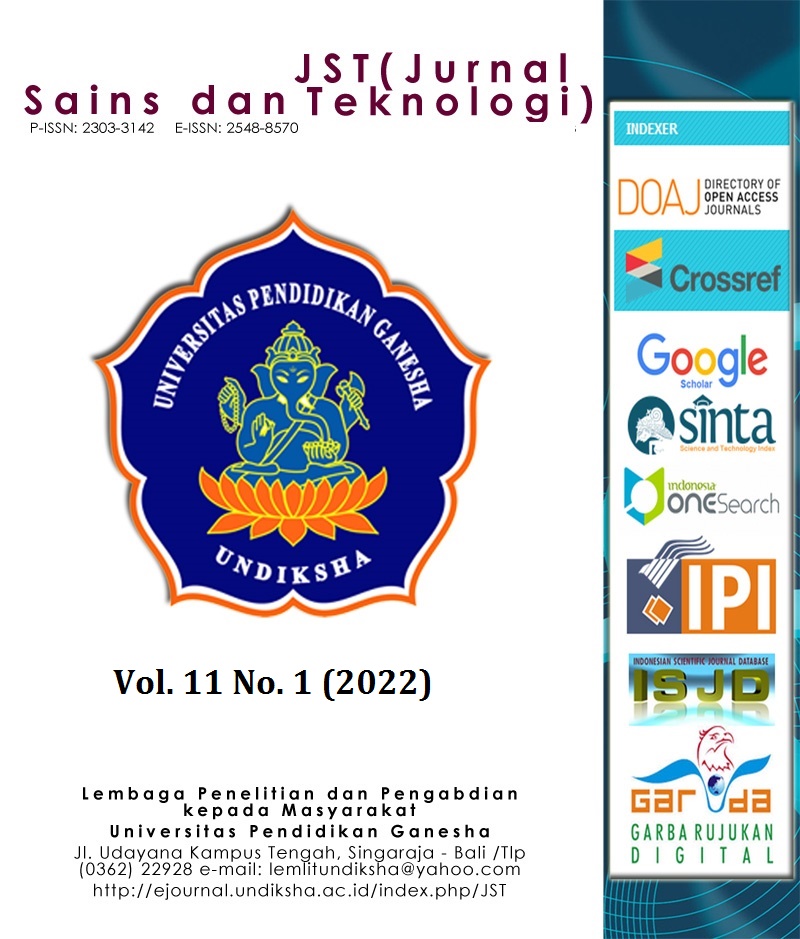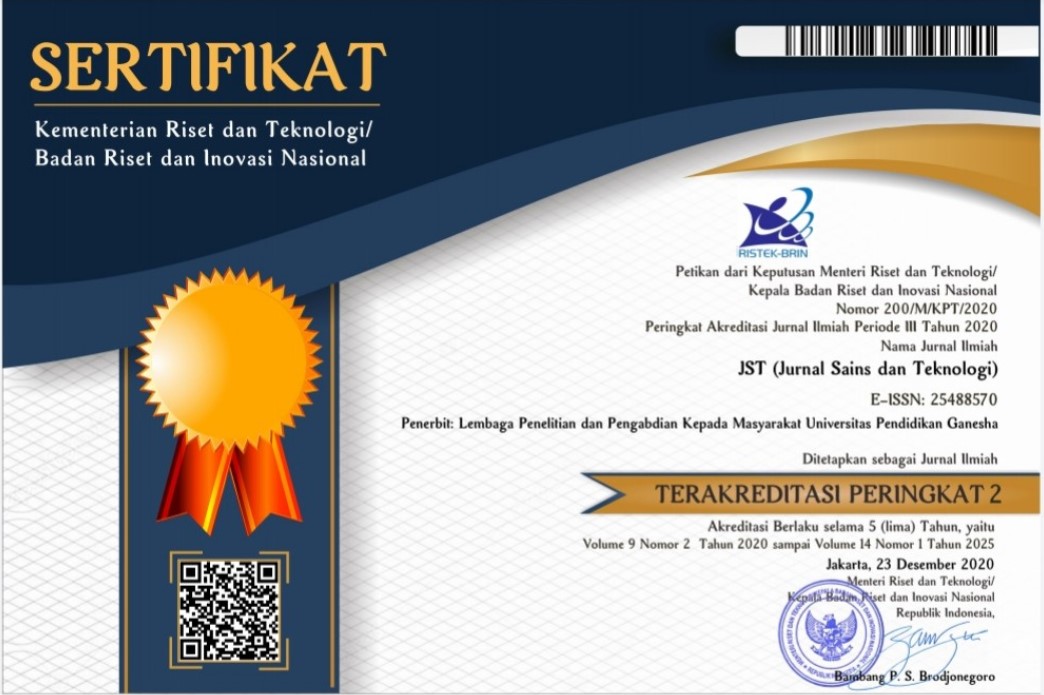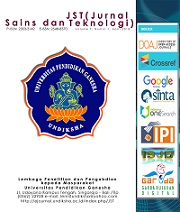Partial Fourier Transform Methods to Solve the Solution Formula of Stokes Equation in Half-Space
DOI:
https://doi.org/10.23887/jstundiksha.v11i1.39523Keywords:
Stokes equation, Partial Fourier transform, half space, resolvent problem, Laplace transformAbstract
Fluida adalah suatu bentuk materi yang memiliki zat cair, gas, dan plasma. Dalam kehidupan sehari-hari, cairan menjadi bagian penting, seperti bagian dari darah dan juga membantu tubuh mendapatkan nutrisi. Selain itu, beberapa fenomena lingkungan terkait erat dengan mekanika fluida. Konsep fluida membantu kita memahami perilaku fluida dengan berbagai kondisi. Telah diketahui bahwa gerak fluida dapat digambarkan dalam model matematika khususnya dalam bentuk persamaan diferensial parsial (PDE) dan disebut sebagai persamaan navier stokes (NSE). Persamaan navier stokes diturunkan dari keseimbangan kekekalan massa dan kekekalan momentum. Dalam penelitian ini mempertimbangkan rumus solusi linierisasi persamaan navier stokes (NSE) dengan masalah nilai batas awal (IBV) dalam ruang setengah tanpa tegangan permukaan. Masalah model yang dipertimbangkan meliputi jenis fluida nonlinier. Prosedur penelitian yang merupakan transformasi model masalah menggunakan transformasi fourier dari sistem persamaan yang baru. Kemudian dihitung rumus solusi dari sistem persamaan baru untuk kecepatan dan kepadatan dari masalah model dengan menggunakan metode transformasi Fourier dan transformasi fourier parsial. Strategi untuk mendapatkan solusi masalah model didasarkan pada analisis beberapa penyelesaian masalah model yang diperoleh dengan menggunakan transformasi laplace dari persamaan stokes. Oleh karena itu, secara khusus, rumus kecepatan v=(v_1,…,v_N ) dan kepadatan (x,t) dari persamaan stokes diperoleh.
References
Adams, R. A., & Fournier, J. J. F. (2003). Sobolev spaces. Elsevier.
Alif, A. H., Maryani, S., & Nurshiami, S. R. (2021). Solution Formula of the Compressible Fluid Motion in Three Dimension Euclidean Space using Fourier Transform. Journal of Physics: Conference Series, 1751(1), 12006. https://doi.org/10.1088/1742-6596/1751/1/012006.
Baranovskii, E. S. (2019). Steady flows of an Oldroyd fluid with threshold slip. Communications on Pure & Applied Analysis, 18(2), 735. https://doi.org/10.3934/cpaa.2019036.
Bikri, I., Guenther, R. B., & Thomann, E. A. (2010). The Dirichlet to Neumann Map-An Application to the Stokes Problem in Half Space. Discrete & Continuous Dynamical Systems-S, 3(2), 221. https://doi.org/10.3934/dcdss.2010.3.321.
Enomoto, Y., & Shibata, Y. (2013). On the $Mathcal {R} $-Sectoriality and The Initial Boundary Value Problem for The Viscous Compressible Fluid Flow. Funkcialaj Ekvacioj, 56(3), 441–505. https://doi.org/10.1619/fesi.56.441.
Gawin, D., Pesavento, F., & Schrefler, B. A. (2011). What Physical Phenomena Can Be Neglected When Modelling Concrete at High Temperature? A Comparative Study. Part 1: Physical Phenomena and Mathematical Model. International Journal of Solids and Structures, 48(13). https://doi.org/10.1016/j.ijsolstr.2011.03.004.
Girault, V., & Raviart, P.-A. (2012). Finite Element Methods for Navier-Stokes Equations: Theory and Algorithms (Vol. 5). Springer Science & Business Media.
Huanran, Xiaoming, Shengqing, & Yuanda. (2022). Dynamic Fluid Transport Property of Hydraulic Fractures and Its Evaluation Using Acoustic Logging. Petroleum Exploration and Development, 49(1). https://doi.org/10.1016/S1876-3804(22)60018-1.
Inna, S., Maryani, S., & Saito, H. (2020). Half-Space Model Problem for A Compressible Fluid Model of Korteweg Type with Slip Boundary Condition. Journal of Physics: Conference Series, 1494(1), 12014. https://doi.org/10.1088/1742-6596/1494/1/012014.
Kubo, T., & Shibata, Y. (2021). On The Evolution of Compressible and Incompressible Viscous Fluids with a Sharp Interface. Mathematics, 9(6), 621. https://doi.org/10.3390/math9060621.
Kumar, Y., & Singh, V. K. (2021). Computational Approach Based on Wavelets for Financial Mathematical Model Governed by Distributed Order Fractional Differential Equation. Mathematics and Computers in Simulation, 190. https://doi.org/10.1016/j.matcom.2021.05.026.
Le, Q. T., & Ooi, C. (2021). Surrogate Modeling of Fluid Dynamics with A Multigrid Inspired Neural Network Architecture. Machine Learning with Applications, 6. https://doi.org/10.1016/j.mlwa.2021.100176.
Liu, C., & Li, Z. (2011). On The Validity of The Navier-Stokes Equations for Nanoscale Liquid Flows: The Role of Channel Size. AIP Advances, 1(3), 32108. https://doi.org/10.1063/1.3621858.
Liu, J., Kuang, W., Liu, J., Gao, Z., Rohani, S., & Gong, J. (2022). In-Situ Multi-Phase Flow Imaging for Particle Dynamic Tracking and Characterization: Advances and Applications. Chemical Engineering Journa, 438. https://doi.org/10.1016/j.cej.2022.135554.
Maryani, S. (2016a). Global Well‐Posedness for Free Boundary Problem of The Oldroyd‐B Model Fluid Flow. Mathematical Methods in the Applied Sciences, 39(9), 2202–2219. https://doi.org/10.1002/mma.3634.
Maryani, S. (2016b). On The Free boundary problem for the Oldroyd-B Model in the maximal Lp–Lq regularity class. Nonlinear Analysis: Theory, Methods & Applications, 141, 109–129. https://doi.org/10.1016/j.na.2016.03.024.
Maryani, S., Nugroho, L. B., Sugandha, A., & Guswanto, B. H. (2021). The Half-Space Model Problem for Compressible Fluid Flow. Limits: Journal of Mathematics and Its Applications, 18(1), 37–44. https://doi.org/10.12962/limits.v18i1.8291.
Maryani, S., & Saito, H. (2017). On the $Mathcal {R} $-Boundedness of Solution Operator Families for Two-Phase Stokes Resolvent Equations. Differential and Integral Equations, 30(1/2), 1–52.
Murata, M., & Shibata, Y. (2020). The Global Well-Posedness for The Compressible Fluid Model of Korteweg Type. SIAM Journal on Mathematical Analysis, 52(6), 6313–6337. https://doi.org/10.1137/19M1282076.
Murena, F., Gaggiano, I., & Mele, B. (2022). Fluid Dynamic Performances of A Solar Chimney Plant: Analysis of Experimental Data and CFD Modelling. Energy, 49. https://doi.org/10.1016/j.energy.2022.123702.
Oishi, K. (2021). A Solution Formula and The ℛ‐Boundedness for The Generalized Stokes Resolvent Problem in An Infinite Layer with Neumann Boundary Condition. Mathematical Methods in the Applied Sciences, 44(5), 3925–3959. https://doi.org/10.1002/mma.6999.
Porfyrakis, P., & Tsitsas, N. L. (2019). Nonlinear Electromagnetic Metamaterials: Aspects on Mathematical Modeling and Physical Phenomena. Microelectronic Engineering, 216. https://doi.org/10.1016/j.mee.2019.111028.
Saito, H. (2020). On The Maximal Lp-Lq Regularity for A Compressible Fluid Model of Korteweg Type on General Domains. Journal of Differential Equations, 268(6), 2802–2851.
Saito, H., & Shibata, Y. (2016). On Decay Properties of Solutions to The Stokes Equations with Surface Tension and Gravity in The Half Space. Journal of the Mathematical Society of Japan, 68(4), 1559–1614. https://doi.org/10.1016/j.jde.2019.09.040.
Saito, H., & Zhang, X. (2019). Unique Solvability of Elliptic Problems Associated with Two-Phase Incompressible Flows in Unbounded Domains. ArXiv Preprint ArXiv:1912.00135.
Sakhr, J., & Chronik, B. A. (2017). Solving the Navier-Lame Equation in Cylindrical Coordinates UsingTthe Buchwald Representation: Some Parametric Solutions with Applications. ArXiv Preprint ArXiv:1704.06669.
Seadawy, A. R., Ali, A., & Albarakati, W. A. (2019). Analytical Wave Solutions of The (2 + 1)-Dimensional First Integro-Differential Kadomtsev-Petviashivili Hierarchy Equation by Using Modified Mathematical Methods. Results in Physics, 15. https://doi.org/10.1016/j.rinp.2019.102775.
Shibata, Y. (2018). On The Local Wellposedness of Free Boundary Problem for The Navier-Stokes Equations in An Exterior Domain. Communications on Pure & Applied Analysis, 17(4), 1681. https://doi.org/10.3934/cpaa.2018081.
Sittipol, W., Sronsri, C., & U-yen, K. (2021). Effect of Magnetic Fields on the Efficiency of The Photocatalytic Degradation of Methylene Blue in a Dynamic Fluid System. Journal of Cleaner Production, 325. https://doi.org/10.1016/j.jclepro.2021.129284.
Teimouri, Z., Borugadda, V. B., Dalai, A. K., & Abatzoglou, N. (2022). Application of Computational Fluid Dynamics for Modeling of Fischer-Tropsch Synthesis as A Sustainable Energy Resource in Different Reactor Configurations: A Review. Renewable and Sustainable Energy Reviews, 160. https://doi.org/10.1016/j.rser.2022.112287.
Watanabe, K. (2018). Compressible–Incompressible Two-Phase Flows with Phase Transition: Model Problem. Journal of Mathematical Fluid Mechanics, 20(3), 969–1011. https://doi.org/10.1007/s00021-017-0352-3.
Zare, M., Talimi, V., Zendehboudi, S., & Abdi, M. A. (2022). Computational Fluid Dynamic Modeling of Methane Hydrate Formation in A Subsea Jumper. Journal of Natural Gas Science and Engineering, 98. https://doi.org//10.1016/j.jngse.2021.104381.
Zhang, C., Zhu, Y., Lyu, X., & Hu, X. (2022). An Efficient and Generalized Solid Boundary Condition for SPH: Applications to Multi-Phase Flow and Fluid–Structure Interaction. European Journal of Mechanics - B/Fluids, 94. https://doi.org/10.1016/j.euromechflu.2022.03.011.
Downloads
Published
How to Cite
Issue
Section
License
Copyright (c) 2022 JST (Jurnal Sains dan Teknologi)

This work is licensed under a Creative Commons Attribution-ShareAlike 4.0 International License.
Authors who publish with the Jurnal Sains dan Teknologi (JST) agree to the following terms:
- Authors retain copyright and grant the journal the right of first publication with the work simultaneously licensed under a Creative Commons Attribution License (CC BY-SA 4.0) that allows others to share the work with an acknowledgment of the work's authorship and initial publication in this journal.
- Authors are able to enter into separate, additional contractual arrangements for the non-exclusive distribution of the journal's published version of the work (e.g., post it to an institutional repository or publish it in a book), with an acknowledgment of its initial publication in this journal.
- Authors are permitted and encouraged to post their work online (e.g., in institutional repositories or on their website) prior to and during the submission process, as it can lead to productive exchanges, as well as earlier and greater citation of published work. (See The Effect of Open Access)
















